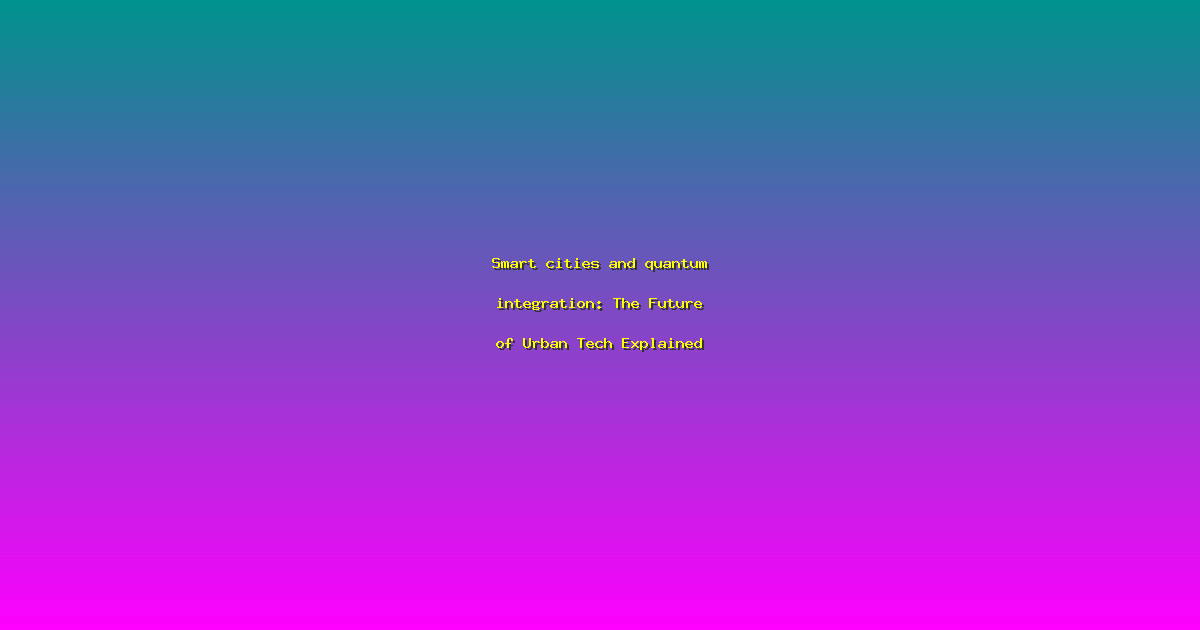Smart Cities and Quantum Integration: The Future of Urban Tech Explained
Imagine cities where traffic flows seamlessly, energy is used efficiently, and public safety is enhanced by cutting-edge technology. This vision of the future is closer than you might think, thanks to the emerging field of quantum integration. As smart cities continue to evolve, the inclusion of quantum technology promises a transformative shift in how urban environments operate, manage resources, and interact with their inhabitants.
The Promise of Quantum Integration
Quantum technology, which leverages principles from quantum physics, holds the potential to revolutionize computing, cryptography, and sensing. When integrated into the fabric of smart cities, it can lead to significant advancements in areas such as data processing, security, and environmental monitoring. The synergy between these two fields is set to redefine urban living, making our cities more sustainable, resilient, and livable.
Applications of Quantum Integration in Smart Cities
Data Processing and Analytics: Quantum computing can process vast amounts of data much faster than traditional computers, enabling real-time analysis of complex urban systems like traffic patterns, energy consumption, and environmental factors. This can lead to more efficient traffic management, dynamic energy distribution, and improved emergency response systems.
Quantum Cryptography for Urban Security: Quantum cryptography provides a secure method of communication that is virtually impossible to hack. As smart cities rely increasingly on interconnected systems, the integration of quantum cryptography will be crucial in protecting sensitive data and ensuring the security of critical infrastructure.
Environmental Sensing and Monitoring: Quantum sensors can detect tiny changes in temperature, pressure, and other environmental factors with exceptional accuracy. This technology can be used to monitor air and water quality, soil conditions, and even seismic activity, providing cities with the data needed to make informed decisions about environmental protection and disaster prevention.
Challenges and Considerations
While the potential benefits are clear, there are also significant challenges to overcome. Quantum technology is still in its infancy, and integrating it into existing smart city infrastructure requires substantial investment and expertise. Moreover, the ethical implications of such advanced surveillance and data collection technologies must also be carefully considered.
FAQs
What is a smart city?
A smart city uses digital technology to enhance the efficiency of services and improve the quality of life for its residents.
How does quantum computing differ from traditional computing?
Quantum computing uses quantum bits (qubits) that can exist in multiple states simultaneously, allowing for the parallel processing of complex computations.
What are quantum sensors?
Quantum sensors exploit quantum phenomena to detect and measure physical quantities with unprecedented precision and sensitivity.
Can quantum integration improve traffic management?
Yes, quantum technologies can enable real-time analysis of traffic patterns, leading to more efficient traffic flow and reduced congestion.
How secure is quantum cryptography?
Quantum cryptography is considered highly secure due to the principles of quantum mechanics, which make it nearly impossible for unauthorized parties to intercept communications without detection.
What ethical considerations arise with quantum integration in smart cities?
Issues include privacy concerns due to advanced surveillance capabilities and the potential for misuse of data. It's crucial to balance technological advancement with ethical governance.
Conclusion and Call to Action
The integration of quantum technology into smart cities represents a significant step forward in urban development. With its potential to enhance efficiency, security, and sustainability, quantum integration could set the stage for a new era of urban living. However, it's important to approach this integration with careful consideration of the associated challenges and ethical implications. As we move forward, it's vital that we engage in ongoing dialogue to ensure that technology serves the needs of all citizens and contributes to the betterment of our urban environments.
Stay informed and engaged as these technologies evolve. Together, we can shape a future where smart cities are not just technologically advanced but also equitable and sustainable.

